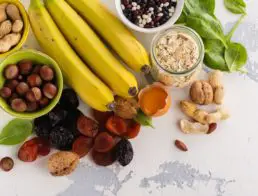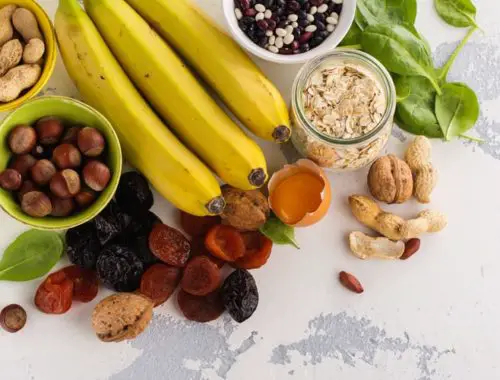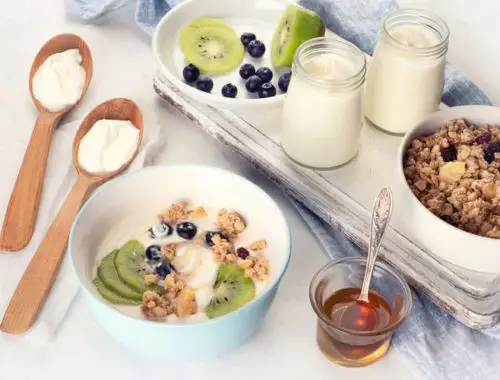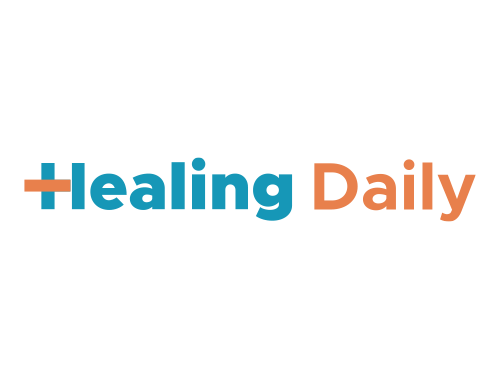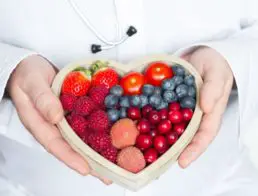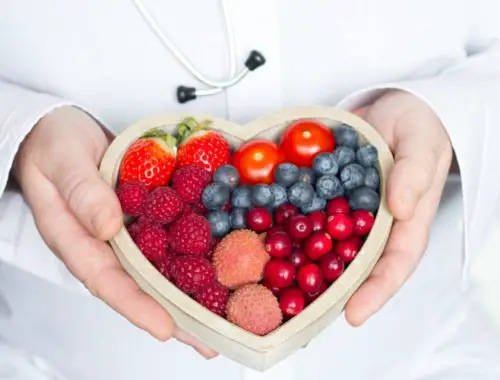Modern-day society has created an epidemic of fatigue. So many people feel a constant pressure to be on-the-go, with far more focus on productivity than on relaxation. While there is nothing inherently wrong with being productive, it’s important to strike a balance between work, family and down-time. Easier said than done, but not impossible.
Getting more energy is sometimes more complex than you might think. Basic principles like more sleep and less stress are definitely important, but there are many other factors to take into account. Boosting your energy levels might be a simple matter of making a few tweaks in your diet and lifestyle, but it could also be digging deeper into underlying causes of fatigue.
Here are thirteen ways to get more energy and start feeling your best:
1. Fuel with Protein
Protein is the most satiating macronutrient, meaning it keeps you full for a longer time, and can greatly help control cravings and excessive appetite throughout the day. On the flip side, a diet high in carbohydrates can set you on a blood sugar rollercoaster, which usually translates to energy dips and spikes.
Along with being important for energy production, protein is also essential for muscle protein and neurotransmitter synthesis, detoxification and reduced inflammation. Everybody’s protein needs will differ depending on genetics, lifestyle and other factors, but a general rule of thumb is 1.0-1.2 grams of protein per kilogram of bodyweight. If you are very active, you’ll likely require more.
2. Try Intermittent Fasting
This one might seem very counterintuitive to boost energy, but many people find that it works wonders. Traditional diet advice over recent decades has been to eat often throughout the day. However, studies now show that in many cases, this is not a natural way of eating for humans. When thinking of our Paleolithic ancestors, there were always times of feast and famine, and they certainly weren’t snacking all day, every day.
Incorporating intermittent fasting along with a healthy diet allows the body to begin burning fat as a fuel source, instead of depending solely on glucose for a quick energy boost. When you abstain from eating for a period of time, the body taps into body fat stores for fuel, which can lead to more sustained energy and weight loss.
The key to intermittent fasting is to be sure your stress levels are in check beforehand, since fasting is a type of stress on the body. If stress levels are normal, fasting is a “good” stress, but it’s best to avoid fasting if you are going through a time of high stress. Second, you’ll want to be sure the meals you do eat are packed full of nutrients, adequate protein and healthy fats. Find your fasting “sweet spot,” and you can start with a simple 16:8 method, meaning you fast overnight for 16 hours and eat for an eight hour window during the day.
The Obesity Code by Dr. Jason Fung is one of my all-time favorite books for learning about fasting, along with other methods to lose weight and get more energy.
3. Move More
It’s also important to find your exercise “sweet spot,” similarly to fasting. In general, studies conclusively show that a sedentary lifestyle contributes to low energy and fatigue, along with other health problems. Sometimes, fatigue and lack of exercise becomes a viscous cycle.
The key is finding ways to move that you enjoy, and thinking outside of the exercise box. If going to the gym is your thing and works with your lifestyle, great! If not, find other ways to move as often as possible. Take the stairs, bike to work, do bodyweight strength training at home in the evening while you watch TV, chase your kids around or go for a walk after dinner. Every opportunity to incorporate more physical activity truly adds up at the end of the day.
When I made the investment in a high quality road bike, my motivation to bike to work exponentially increased! A piece of home gym equipment might better suit your needs, so find what makes sense for you.
4. Increase Your Veggie Intake
Carbohydrates are a quick source of energy, and the bulk of your carbs should come from veggies, and some fruits. Another contributor to low energy is a diet high in refined carbs, as these cause a rapid rise in blood sugar followed by a dip. These dips leave you feeling tired and reaching for more carbs.
Instead of refined carbs like cookies, cakes, juices and crackers, opt for nutrient rich vegetables like leafy greens, cruciferous veggies like broccoli, kale and cauliflower, and satisfying starchy vegetables like sweet potato, potato, plantains and other root veggies. These provide your body with fiber for satiety and a healthy gut, and more sustained energy than refined options.
5. Eliminate Sugar
For the same reasons refined carbs can leave you tired, processed sugar is an even bigger culprit of low energy. Processed forms of sugar like candy, soda and other commercial sweets create a rapid spike in blood sugar, followed by a major dive.
Sugar addiction is a real thing, and quite common. For a complete guide of how to wean off sugar, check out this article.
6. Skip Processed Foods
One key to getting more energy is eating foods that provide the body with the micro and macronutrients necessary to function optimally. Many processed foods can be considered “empty calories,” meaning they aren’t offering much of any nutritional benefit. Taking in these sorts of calories instead of calories that provide important vitamins, minerals and phytonutrients can lead to nutrient deficiencies, which can in turn lead to low energy.
When you shop, stick as much as possible to the perimeter of the grocery store, where the real foods live. Produce, meats, fish, nuts, seeds and whole, plain dairy are usually not found in the aisles.
7. Eat More Healthy Fats
Many people have lived within a diet paradigm that fears fat, and this often leaves you hungry and tired. Fat is a key micronutrient for energy, and quality matters.
One excellent source of healthy fat is wild fatty fish, like salmon. This is a great source of protein, omega 3 fatty acids, and B vitamins, all of which are essential for energy production. Lack of omega 3 fats has also been associated with increased inflammation, which can lower energy.
Other nourishing fats include olive and olive oil, coconut and coconut oil, nuts, seeds and avocado. Since fresh wild salmon is pricey, I like to stock up on Wild Planet canned salmon to add into salads throughout the week.
8. Sleep Enough
Not enough sleep is one of the more obvious reasons your energy is low, but it’s not always so simple. Even if you are in bed for the recommended 7-8 hours per day, the quality of your sleep is also important. Sleep is the time when your body has a chance to release hormones that regulate energy and metabolism, among other important functions.
A sign that you’re getting high quality sleep is waking up truly refreshed and rested. This usually means that you’ve gone through all stages of sleep cycles and had sufficient periods of uninterrupted sleep.
If you know or suspect a problem, you could be dealing with high cortisol levels waking you up during the night, sleep apnea or another underlying issue. Learn about healthy sleep hygiene here, and work with a doctor if a medical problem could be causing poor sleep.
9. Drink Caffeine, But Not Too Much
Physiologically, caffeine increases energy by boosting the release of catecholamines, like adrenaline. This stimulant has been shown to improve mood, energy, memory and more. So, your morning cup of coffee or tea can give you more energy, but you don’t want to go overboard.
Having one or two cups of coffee in the morning is fine (and maybe even beneficial) for most people, but depending on caffeine to keep your energy up throughout the day is likely the sign of a problem. Green tea is a great alternative to coffee later in the day, and try to limit all caffeine after 2pm to ensure a good night’s sleep.
10. Stay Hydrated
Dehydration can easily be experienced as low energy, and studies show that even slight dehydration can lead to feelings of fatigue. Instead of reaching for another cup of coffee or a sugar snack for a boost, first try drinking a big glass of water. Shoot for a minimum of half of your body weight (in pounds) in ounces of water per day.
11. Consider Nutrient Deficiencies
If you’ve made all of the diet and lifestyle changes that can boost energy but are still fatigued, you might find an integrative or functional medicine doctor in your area to test for nutrient deficiencies. Deficiencies that are commonly linked with low energy include vitamin B12 and other B vitamins, magnesium, iron, vitamin D, omega 3 fatty acids and potassium.
12. Take a Look at Hormones
Along with testing for nutrient deficiencies, you might also need to consider hormonal imbalances as a potential cause of fatigue if other things haven’t helped. Much of the body’s function depends on hormone production and balance, and things getting thrown out of wack can create a cascade of problems, including low energy.
Work with a practitioner to test adrenal hormones and thyroid hormones, first and foremost.
13. Mange Your Stress
Speaking of adrenal hormones, stress can take a huge toll on energy levels. Normal amounts of stress are completely natural and necessary, such as reacting to an emergency, feeling stressed before public speaking or an athletic competition. Chronic stress that continues for long periods of time can wreak havoc on your hormones, and be a major cause of low energy.
Find activities that work for you to lower stress, and there is no perfect answer. Some ideas include meditation, yoga, deep breathing, walking outdoors, talking with friends, hot epsom salt baths or treating yourself to a massage. Self care should be just as high of a priority as exercise and good nutrition.
With these thirteen strategies, you should have a solid base for slowly but surely feeling more energized. Low energy can make each day feel like a struggle, so take the time to make necessary changes that support a happy, healthy and vibrant life.

